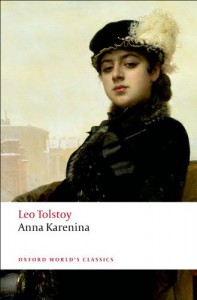
Anna Karenina (Oxford World's Classics)
 The number of times I've written this review, erased it, and completely rewrote it again from a different standpoint speaks volumes of the conflicting nature of ANNA KARENINA itself. Is it a trashy melodrama that wouldn’t be out of place on daytime television? An insightful glimpse into the economy and society of Russia in the twilight hours of the Imperial era? A semi-autobiographical account of Tolstoy’s philosophical awakening?
The number of times I've written this review, erased it, and completely rewrote it again from a different standpoint speaks volumes of the conflicting nature of ANNA KARENINA itself. Is it a trashy melodrama that wouldn’t be out of place on daytime television? An insightful glimpse into the economy and society of Russia in the twilight hours of the Imperial era? A semi-autobiographical account of Tolstoy’s philosophical awakening?As one of the “greatest books ever written,” ANNA KARENINA has quite the reputation to live up to. To some extent, it succeeds.
In a world where stories tend to share similar conventions and predictable character arcs, Tolstoy’s take on family drama is a welcome change of pace. Most notably, numerous characters evolve (and devolve) independently of one another, and their spur of the moment passions inevitably coalesce into long-lasting consequences. It creates the perfect depiction of the struggles of humanity and society alike in a (somewhat) relatable setting. Furthermore, ANNA KARENINA is a masterwork of human fickleness. Entire philosophies are constructed only to be corrupted by an off-hand statement or a plot twist in the next chapter in a way that doesn’t feel cheap or insincere. Tolstoy’s ability to capture a moment and internalize it completely shines in a way that no other author can compare.
On the other hand, it also feels no one in mid-19th century Russia could hold a conviction longer than a few minutes. Take your pick.
Unfortunately, the actual act of reading ANNA KARENINA is exhausting. The technique is unrivaled, but story itself is… lacking, to say the least. While the book’s famous long internal diatribes are intellectually stimulating, they kill whatever momentum the plot has. Meanwhile, when the plot—which I can only describe as a tacky soap opera combined with heavy doses of A Star Is a Born symbolism—finally moves along, the torrid love affair between Vronksy and Anna is undeveloped at best. Levin’s half of the book is only barely better in comparison. While there are excellent and insightful moments in the narrative, the sum of its parts is weighed down by its unending dullness. It’s the type of book where literary analyses of the text prove far more fascinating than the story itself.
The Oxford/Maude translation itself deserves mention, as its lyrical quality makes the heavy material in the text easy to digest. The kindle edition, however, is riddled with numerous typographical errors. The decision to place the Oxford edition’s brief biographical information about Tolstoy before the actual story is also questionable, as it spoils some of the novel’s plot points.
Of course, whether or not it’s possible to “spoil” a well-regarded classic that’s almost 150 years old is beside the point.
The best parts of ANNA KARENINA are the moments of human catharsis captured just as the dominoes of fate begin to fall, and that alone was worth reading the entire book for. For better or worse, I don’t regret the several months it took to force my way through it; maybe that’s all a good book needs to invoke at the end of the day.

















